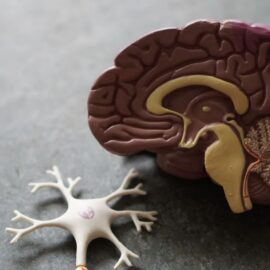
What’s Christianity’s perspective on mental health? What has science done to solve mental health problems?
According to The Wisdom of Insecurity by Alan Watts, one way people cope with anxiety is by seeking comfort in religion or science. Watts believes Western perspectives (Christianity and science) on insecurity are inadequate, and that the Eastern approach is more valuable.
Continue reading to learn more about why Watts thinks science, mental health, and Christianity aren’t compatible.
Science, Mental Health, and Christianity
Philosopher Alan Watts believes that mental health and Christianity don’t often go together. Watts explains that the thinking self attempts to impose order and stability on life by naming and classifying your experiences. For example, labeling an animal you see with the word “dog” helps you predict how that animal will behave. Naming and classifying seems to make life more predictable. Watts says that for much of Western history, people seeking predictability have adopted Christianity, which promises eternal life, an unchanging God, and permanent values. Then, Westerners turned to science, which offered security in the form of immutable, universal laws and the potential of happiness on earth instead of in the afterlife (for example, by reducing suffering with the help of modern medicine).
(Shortform note: Some research suggests that Watts is right about the human desire for predictability—generally, we prefer to have as much information as possible about (and thus the ability to name or classify) future events, so much so that we find uncertainty more stressful than certain suffering. Research also supports Watts’s statement that religious beliefs serve to provide comfort in the face of unpredictability; belief in science provides a similar kind of comfort for those who are secular. Although Watts attributes finding existential comfort in either religion or science to Western culture, note that many Eastern religions also provide adherents with comforting wisdom about life’s uncertainties and that science isn’t a uniquely Western invention.)
However, Watts says that around the time he was writing this book (the 1950s), Westerners had found both Christianity and science unsatisfying for the reasons listed above: Focusing on the future is futile and dilutes your experience of the present. This made people feel like life had no meaning, and they turned to consumerism (also futile) for comfort.
(Shortform note: Although Watts writes that Westerners turned to consumerism because neither religion nor science could fully satisfy them, other experts say consumerism emerged in response to industrialization in the West in the latter half of the 1800s. Industrialization consolidated wealth in the hands of manufacturing plant owners, who were incentivized to seek further profits by promoting greater desire for non-essential goods. This resulted in a large-scale cultural and economic shift, where accumulating goods was seen as key to happiness. Economist and Christian ethicist Bruce P. Rittenhouse agrees with Watts that consumerism promotes happiness by serving a semi-spiritual purpose—accumulation imparts a sense of meaning, which combats fears about death.)
How Eastern Spirituality Helps You Accept Insecurity
Based on his understanding of Eastern philosophy, Watts says that using religion and science to cope with insecurity is inadequate for a few reasons. First, it strengthens your tendency to identify with your thinking self over your animal self—you believe you can classify experiences because you’re an objective, outside observer. Watts says that you’re not outside of experience—you are your experience. He reasons that if everyone is their experience, then all of existence is composed of experience—which means that you’re part of an ever-changing, unified whole, rather than a stable, independent entity (your thinking self).
Second, Watts argues that religion and science are merely representations of existence, so they’ll never be fulfilling; clinging to these representations is like clinging to a photo of your friends instead of to your friends themselves. He adds that though religions attempt to represent existence, existence can’t be understood by the thinking self—it can only be understood experientially by the animal self that’s living in the moment. Trying to name and classify existence as an independent, objective observer removes you from the experience, so you’ll miss out on aspects of the experience. For example, according to this logic, you’d learn more about running by going for a run than you’d learn by reading about running or watching others run.
Finally, imposing order on existence by accepting religious or scientific beliefs is a form of your thinking self’s resistance to change, and Watts argues that it’s only by accepting insecurity that you can find spiritual understanding and fulfillment. He says you can have spiritually meaningful experiences when your animal self is living in the moment and your thinking self admires the incomprehensible beauty of existence—a phenomenon he refers to as “wonder.”
However, Watts says that traditional religious beliefs are useful when understood metaphorically. He explains that everything that exists is intricately, irrevocably interdependent and that all iterations of God, in all religions, symbolize the essential unity of all of existence. He encourages you to think of the Christian notion of an eternal afterlife where you’re joined with God as a metaphor—one that symbolizes that the present is the only thing you can ever experience and that you’re always already joined with all other existence.






